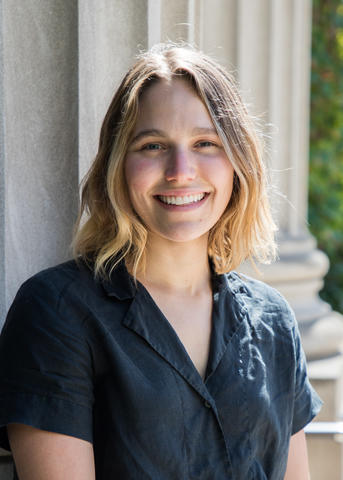
Alexandra Scott
E-MAIL: [email protected]
PhD: 2023
PhD Thesis
The role of ventral pallidal GABAergic neurons in cue-elicited reward seeking and consumption.
Undergraduate Institution and Major:
University of California, B.S. in Neuroscience, 2015
Graduate Advisor:
Jocelyn Richard, Ph.D., Department of Neuroscience
Description of Graduate Research:
Currently I am examining the cell specific role of GABAergic neurons in the ventral pallidum and how these neurons contribute to reward seeking behavior. Future research will explore the role of GABAergic neurons that project from the ventral pallidum to the lateral hypothalamus and how these neurons contribute to reward seeking behavior.
Graduate Publications:
- Ventral pallidum neurons projecting to the ventral tegmental area reinforce but do not invigorate reward-seeking behavior. Cell Rep. 2024 Jan 8;43(1):113669.
- Ventral pallidal GABAergic neuron calcium activity encodes cue-driven reward seeking and persists in the absence of reward delivery. J Neurosci. 2023 Jul 12;43(28):5191-5203.
Graduate Oral Presentations:
- Scott AK. The effect of a high fat diet on endocannabinoid mediated astrocyte-neuron signaling in the arcuate nucleus, Bertinoro, Italy, 2019
Graduate Abstracts:
- Scott AK., Murat C, Araque A. The effect of a high fat diet on endocannabinoid mediated astrocyte-neuron signaling in the arcuate nucleus.Wallin Neuroscience Day; Minneapolis, MN, May 2019.
Graduate Awards:
- Diversity of Views and Experience Fellowship (DOVE), University of Minnesota, 2017
- Medical School Graduate Fellowship, University of Minnesota, 2017
Graduate Committees:
Career Facilitation Committee 2018-2020
Professional Memberships:
Society for Neuroscience, 2019
Rotations:
Robert Meisel, Ph.D., Department of Neuroscience
Alfonso Araque, Ph.D., Department of Neuroscience
Esther Krook-Magnuson, Ph.D., Department of Neuroscience
Research Categories:
- Behavorial and Cognitive Neuroscience
- Neuroimaging and Optogenetics
- Neuroscience of Drug Abuse and Addiction
- Synaptic Plasticity and Learning
Undergraduate Publications:
- Wong AM, Scott AK, Johnson CS, Mohr,MA, Mittelman‐Smith,M, Micevych PE. ERαΔ4, an ERα splice variant missing exon4, interacts with caveolin‐3 and mGluR2/3. JJ Neuroendocrinol. 2019 Jun;31(6):e12725.
Undergraduate Awards:
Dean’s Prize Medal of Excellence in Undergraduate Research, 2015
Undergraduate or Post-Bac Research:
During my undergraduate career, I worked with Dr. Paul Micevych studying the role of progesterone signaling in the positive feedback loop that initiates the luteinizing hormone surge required for ovulation in the female rodent. I examined this progesterone signaling in kisspeptin neurons within the anterior part of the hypothalamus.
After graduating I continued my work in the Micevych lab. I built off my previous work and studied progesterone signaling in astrocytes within the hypothalamus. I also examined another subset of kisspeptin neurons in the arcuate nucleus of the hypothalamus involved in negative feedback. I utilized a number of biochemical assays, immunohistochemistry, and calcium imaging to conduct my research.
What Got You Interested In Research?
My initial interest in research stems from asking a question, any question, and being able to test this question by meticulously manipulating variables. To me, research is a perfect outlet for creativity, curiosity, and conscientiousness. I also believe it is the place where I can collaborate to find solutions to problems that affect the world. I have maintained my interest because there are an incalculable number of questions yet to be answered, which allows for a continued ability to expand knowledge through scientific research.
Why Did You Choose MN?
The environment at the University of Minnesota is very unique. The people within the Graduate Program in Neuroscience are concerned not only with providing an excellent education but also with offering the resources to succeed inside and outside the lab. On top of that, everyone is supportive and collaborative, which I think creates the best science.
Student Mentor and the Best Advice They Gave:
Jennifer Cook: Never be afraid to ask for help! This applies in the classroom and in the lab.
Favorite Itasca Memory:
My wonderful classmates allowed me to lead them through a 90-minute yoga class on the edge of Lake Itasca. It was a magical moment being able to share something I love with all these awesome and open minded people in such a beautiful place.
